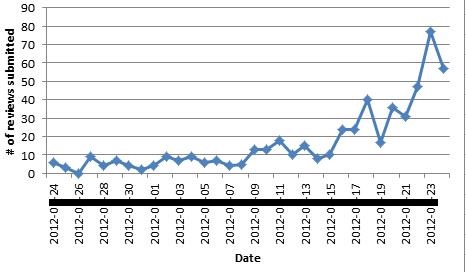Today, I will write about the work of reviewers for scientific conferences. As you probably know, when a researcher submit a paper to a conference, the paper is assigned to usually three or more reviewers. The program chair of the conference usually give one or two months to the reviewers to perform the reviews.
Recently, I had access to data about the number of reviews submitted by reviewers per day for a computer science conference. I have put this data on a chart that you can see below:
It is interesting to see that reviewers seem to procrastinate. As it can be seen on the chart, during a reviewing period of one month, most reviews were submitted during the last few days, just before the deadline. Therefore, this raise the question of how much time does a reviewer really needs to perform review? If a typical reviewer would be given two months or three months instead of one month, would s/he also wait to submit the reviews during the last few days?
I have to say that reviewers are usually very busy and have to review several papers. A reason for late review may be that reviewers prefer to submit all of their reviews at the same time or are just too busy!
I just wanted to share this interesting observation. If you like this blog, you can tweet about it and/or subscribe to my twitter account @philfv to get notified about new posts.
–
Philippe Fournier-Viger is the founder of the open-source data mining software SPMF, offering more than 50 data mining algorithms.






Pingback: Conference reviewers procrastinate? - The Data ...
it might also be the case that reviewers use the flexibility in terms of doing their reviews to attend to more urgent matters/matters that are more pressing. As the time for submission gets closer, the urgency of submitting the review rises and the number of reviews going in too.
Time discounts in a way 😉
If I remember correctly, there should be some classical psychological paper on the effect of time on the evaluation of consequences which would apply here..